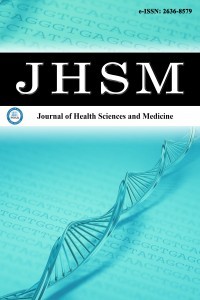Does face mask affects sleep quality in patients with nasal septal deviation: evaluated by mini sleep questionnarie
Objectives: The aim of this study was to investigate the effects of face mask usage on the sleep quality of patients with nasal septal deviation.
Material and Method: Thirty-four patients with unilateral nasal septum deviation (Group 1) and 27 healthy subjects without septum deviation (Group 2, control) were included in the study. Mask usage time per day (hours) in the last week, weight, length and BMI values, smoking, and alcohol habits were asked. In both groups, the sleep quality of the patients was evaluated by Mini Sleep Questionnaire (MSQ). Sleep delay (SD), sleep awakenings (SA), sleep medications (SM), daytime sleep (DS), morning fatigue (MF), habitual snoring (HS), morning awakening (MA), morning headache (MH), chronic fatigue (CF), and restless sleep (RS); and total MSQ items were evaluated.
Results: All subjects used surgical masks. In the nasal septal deviation group, the right-sided deviation was detected in 15 (44.1%) patients and left-sided deviation was detected in 19 (55.9%) patients. Deviation located was anterior deviation in 12 (35.3%) patients, posterior deviation in 13 (38.2%) patients and antero-posterior deviation in 9 (26.5%) patients. Sleep Medications (SM) and Morning Headache (MH) values of the deviation group (Group 1) were significantly lower than those in the control group (p0.05). In older patients with septal deviation, Sleep Awakenings (SA), Habitual Snoring (HS), Morning Awakening (MA), and Total MSQ scores increased (p
Keywords:
Facial mask, sleep, surgical mask, nasal septal deviation, Mini Sleep Questionnaire (MSQ).,
___
- Kara M, Erdoğan H, Güçlü O, Sahin H, Dereköy FS. Evaluation of sleep quality in patients with nasal septal deviation via the Pittsburgh sleep quality index. J Craniofac Surg 2016; 27: 1738-40.
- Zomer J, Peled R, Rubin AHE, Lavie P. Mini Sleep Questionnaire for screening large populations for excessive daytime sleepiness complaints. In: Koella EW, Ruther E, Schulz U (Eds). Sleep 84. Stuttgart, Gustav Fisher Verlag, 1985, pp 467-70.
- Bayar Muluk N, Oğuztürk Ö, Arikan OK, Dikici O. Does sleep quality affect quality of lives of the workers exposed to occupational noise? Bidder Tıp Bilimleri Derg 2010; 2: 13-9
- Uygur K, Tüz M, Dogru H. The correlation between septal deviation and concha bullosa. Otolaryngol Head Neck Surg 2003; 129: 33–6.
- Sleep and Sleep Disorders. Centers for Disease Control and Prevention. (CDC-Accessed online at january 24, 2022).
- Gulec TC, Yoruk O, Gulec M, et al. Benefits of submucous resection on sleep quality, daytime and dream anxiety in patients with nasal septal deviation. Sleep Biol Rhythms 2013; 11: 227–36.
- Stewart MG, Smith TL, Weaver EM, et al. Outcomes after nasal septoplasty: results from the Nasal Obstruction Septoplasty Effectiveness (NOSE) study. Otolaryngol Head Neck Surg 2004; 130: 283–90.
- Vural S, Tas E, Gursel AO. Evaluation of septoplasty patients with health status scale, rhinomanometry, and computed tomography. Kulak Burun Bogaz Ihtis Derg 2008; 18: 166–70.
- Fidan T, Fidan V, Ak M, et al. Neuropsychiatric symptoms, quality of sleep and quality of life in patients diagnosed with nasal septal deviation. Kulak Burun Bogaz Ihtis Derg 2011; 21: 312–7.
- Purushothaman PK, Priyangha E, Vaidhyswaran R. Effects of prolonged use of facemask on healthcare workers in tertiary care hospital during COVID-19 pandemic. Indian J Otolaryngol Head Neck Surg 2021; 73: 59–65.
- Senaratna CV, Perret JL, Lodge CJ, et al. Prevalence of obstructive sleep apnea in the general population: A systematic review. Sleep Med Rev 2017; 34: 70-81.
- Monini S, Meliante PG, Salerno G, et al. The impact of surgical masks on the nasal function in the COVID-19 era. Acta Otolaryngol 2021; 141: 941-7.
- Cengiz C, Can IH. The effect of N95 and surgical masks on mucociliary clearance function and sinonasal complaints. Eur Arch Otorhinolaryngol 2021: 1–6.
- Sinkule EJ, Powell JB, Lee Goss F. Evaluation of N95 respirator use with a surgical mask cover: effects on breathing resistance and inhaled carbon dioxide. Ann Occup Hyg 2013; 57: 384-98.
- Tobaldini E, Costantino G, Solbiati M, et al. Sleep, sleep deprivation, autonomic nervous system and cardiovascular diseases. Neurosci Biobehav Rev 2017; 74: 321-9.
- Jordan AS, McSharry DG, Malhotra A. Adult obstructive sleep apnoea. Lancet 2014; 383: 736-47.
- Lee KI, In SM, Kim JY, et al. Association of nasal septal deviation with the incidence of anxiety, depression, and migraine: A national population-based study. PLoS One 2021; 16: e0259468.
- Cakir U, Sereflican M, Tuman TC, Yurttas V, Yildirim O, Oral M. Sleep and life quality of individuals with septum deviation. Psychiatry Clin Psychopharmacol 2016; 26: 88-188.
- Dias PS, de Araujo-Melo MH, Neves DD, Lemes LN, Mosciaro MS, Bedoya S. Correlation between the oropharyngo-laryngoscopic findings and the severity of obstructive sleep apnea. Rev Col Bras Cir 2015; 42: 289-94.
- Bradshaw DA, Ruff GA, Murphy DP. An oral hypnotic medication does not improve continuous positive airway pressure compliance in men with obstructive sleep apnea. Chest 2006; 130: 1369-76.
- Yayın Aralığı: Yılda 6 Sayı
- Başlangıç: 2018
- Yayıncı: MediHealth Academy Yayıncılık
Sayıdaki Diğer Makaleler
Murat Bulut ÖZKAN, Ramazan TOPCU, Fatih ŞAHİN, Murat Baki YILDIRIM
Bedirhan Sezer ÖNER, Ahmet Kağan AS
Bahadır SANCAR, İrfan ÜSTÜNDAĞ
Nurdan FİDAN, Havva Nur Peltek KENDİRCİ
Ayşenur BOTSALİ, Aslan YÜREKLİ
Nihal MAVRAL, Pınar KIRICI, Kadriye YAKUT, Filiz AVŞAR
Orhan BALTA, Kübra ŞAHİN, Çağatay ZENGİN, Mehmet Burtaç EREN, Harun ALTINAYAK, Osman DEMİR
Feray Ferda ŞENOL, İlkay BAHÇECİ, Nuray ARSLAN, Özlem AYTAÇ, Pinar ÖNER, Zülal AŞCI TORAMAN
